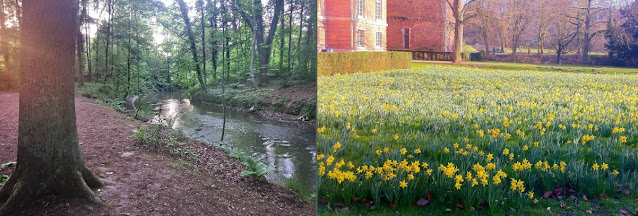By Michael Van Hout and Hannes
De Praitere
Imagine
this: when walking in a city on a hot summer day, where would you like to spend
your afternoon. Most likely, your answer would be a cooler area near a park or
a pond. However, on days like these it can be quite busy in these areas so
perhaps you decide to go outside the urban center instead. What can be done to
alleviate the worst effects of heat waves inside an urban center?
To
tackle that question, we need to first introduce the concept of ‘urban heat
islands’, a scientific term to describe areas within the city where
temperatures are much higher than in the surrounding countryside. In the
context of global warming this is a very real issue city councils have to
urgently address. Hence there has been a lot of scientific investigation into
the main causes of urban heat islands. Some of its main contributors include
high rise buildings, which block wind and reflect additional sunlight to the
surface, and road infrastructure, where asphalt and concrete absorb much
sunlight and release it in the form of additional heat, thus acting like a
glowing furnace. By now it has been widely established that such conditions
form a dangerous situation for the residents, especially children, the elderly
and pregnant women. There is also good news in that several relatively small
adaptations can already greatly reduce the worst effects. As you might have
guessed this includes more plants and trees (the so-called green
infrastructure) and waterways and ponds (the blue infrastructure). However,
they also stress the importance of private gardens in mitigating extreme heat,
which is why they recently started collaborating with Klimaattuiniers,
another KU Leuven initiative focusing on the climate benefits of gardens.
Leuven.cool
map showing the temperature on May 1st 2023 at 2:30 pm
Source: https://www.leuven.cool/
For
the city council it is obviously very important to know where the heat islands
are located. This is where Leuven.cool comes in, an initiative founded in
collaboration between the city council, Leuven 2030 (a non profit organization
aiming to green the city), the KMI (Belgium’s meteorological institute) and KU
Leuven. For its initial phase, residents were asked to install small weather
stations to calculate temperature for a few years, so based on that data the
city can identify the most problematic heat islands. In a more recent phase,
the participants were also asked some questions about how heat waves affect
their way of living. The organization has recently also included measurements
from outside the Leuven area, such as Tervuren, and hopes to develop new
insights based on results from similar projects in other cities as well (e.g.
Ghent and Amsterdam), though also taking into account the unique
characteristics of each city.
The
city of Leuven challenges people, together with Hack Belgium, to find solutions
to measure and reduce the local heat island effect. The most promising solution
will be offered the opportunity to develop the project with support of the city
of Leuven, through the city of Leuven award. The mayor of Leuven, Mohamed
Ridouani supports Leuven 2030 and their motto “to innovate for the better and
for all”. Ridouani stated Leuven
2030 is creating “a new narrative”.
Measuring
station at Pieter De Somer Aula, Leuven. Source: Google Maps
Since
the project is still in its piloting phase of collecting and analyzing the
data, the project has thus far not led to greening initiatives of the city in
the most affected areas. While the Leuven.cool project will be crucial in
mitigating the urban heat island effect, enhancing urban attractiveness, and
providing multiple ecosystem services, it could drastically change the
character of certain neighborhoods and lead to green gentrification and other
negative social effects. However, this does not mean that the project is
undesirable or disadvantageous. Thus far, little concern has been raised by any
of the stakeholders about possible negative effects, or at the very least
stressing that the projects would overall still be beneficial to the city and
the residents. Moreover, the study hopes to show that small changes like
softening the pavement or increasing plant diversity in the private gardens. It
should also be noted that Leuven is already among the most expensive cities in
Belgium, thus additional gentrification effects may be small.
Arenberg
castle and the Dijle river, pictures taken by Hannes De Praitere
In
conclusion, we are convinced of Leuven.cool’s important role in urban climate
mitigation and improving health and other benefits. The project is still young
so most greening initiatives resulting from the study are not for the immediate
future. Still, some caution may be required in context of the threat of green
gentrification and the possible disruption of the social connections within the
city.
References
Garcia-Lamarca, M., Anguelovski, I., Cole, H., Connolly, J. J.,
Argüelles, L., Baró, F., ... &
Shokry, G. (2021). Urban green boosterism and city affordability: For whom is
the ‘branded’ green city?. Urban Studies, 58(1), 90- 112. <https://journals.sagepub.com/doi/10.1177/0042098019885330>.
Leuven.be (n.d.). Ontharden en vergroenen via natuur-gebaseerde
oplossingen, accessed 1 May 2023,
<https://leuven.be/ontharden-en-vergroenen-natuur-gebaseerde-oplossingen>.
Leuven.cool
(n.d.). Leuven 2030, accessed 1 May 2023,
<https://www.leuven.cool/>.
Leuven 2030
(z.d.). accessed 1 May 2023, <https://www.leuven2030.be>.
Vlaamse Milieumaatschappij (2021). Hitte-eilanden in steden
(2012-2020), Vlaamse overheid, accessed 1 May 2023, <https://www.vmm.be/klimaat/hitte-eilanden-in-steden>.
Pierreux,
S. (2019). Hack Belgium: Leuven City challenges you to reduce local heat
stress, accessed 1 May 2023, < https://hackbelgium.be/blog/leuven-challenges-you/>
Waymouth,
L. (2022) Leuven’s journey to becoming carbon neutral, accessed 1 May 2023, <https://citymonitor.ai/environment/leuven-journey-to-becoming-carbon-neutral>
Wouters, E. (2022). Leuven.cool zoekt vrijwilligers die de impact van
hitte in kaart willen brengen. From Het Laatste Nieuws: https://www.hln.be/leuven/leuven-cool-zoekt-vrijwilligers-die-de-impact-van-hitte-in-kaart-willen-brengen~aba38997/






No comments:
Post a Comment